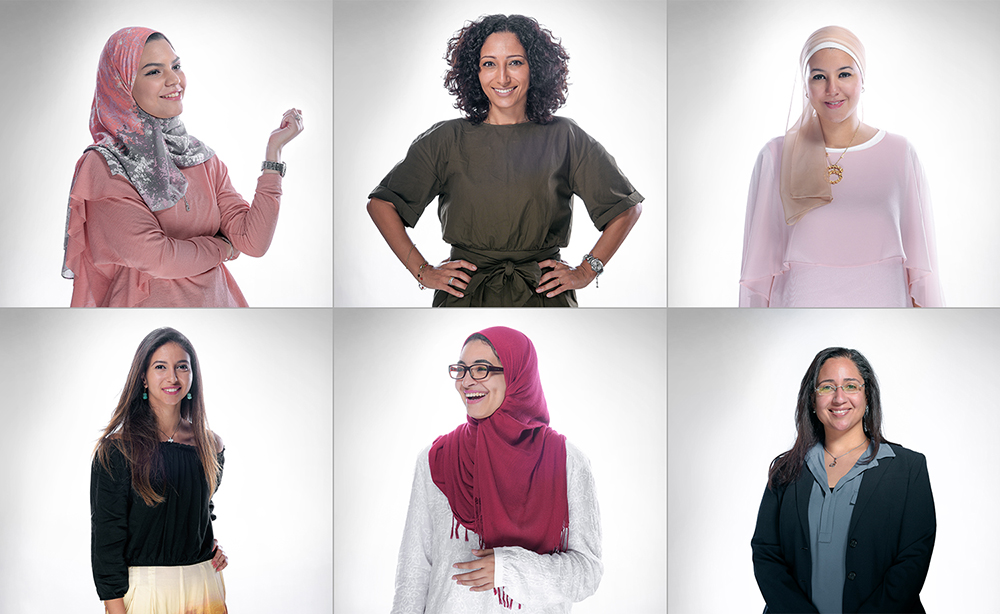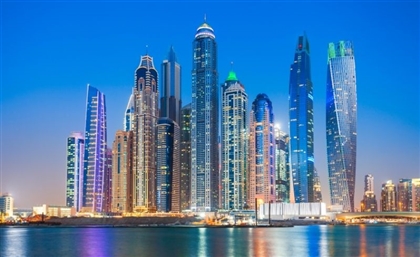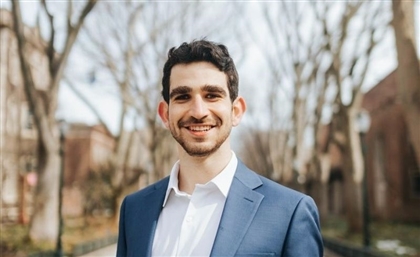6 Egyptian Entrepreneurs Valiantly Empowering Women Through their Startups
From massive consultancies partnering with Facebook, to fierce conferences democratizing the entrepreneurial landscape, to pole fitness studios breaking taboos, these women-led businesses are walking the line between profit-making and fearless change-making - with a gender approach.

Loaded with connotations, coopted by political agendas, used and misused both in detriment and for the benefit of women, empowerment is certainly an equivocal term. But in the heart of the Arab world’s most populous city, female leaders young and old are taking up arms against patriarchy, not with elaborate concepts and feminist diatribes, but by cutting to the chase and getting down to business – quite literally.
Their impact goes beyond inspiring talks: according to a recent report by the McKinsey Global Institute, if there were as many women as men in the MENA labor market, the regional GDP could rise by 47 percent in the next decade, reaching as much as $2.7 trillion by 2025. In the UAE, women’s female entrepreneurs have increased a skyrocketing 58 percent in the last four years; but who’s leading the charge in the more populous Egypt?
They are 24-year-old powerhouses orchestrating conferences to teach youngsters entrepreneurial skills; they are ferocious students standing up against sexual harassment; they are seasoned entrepreneurs confronting corporate patriarchy; they are pole fitness bravehearts, and mindmasters slamming down misogyny in media portrayals of women. Meet some of Egypt’s most ferocious women crafting businesses with a gender-based approach.
May Abdel Asim, founder of What Women Want… Magazine

“Women empowerment starts at home, especially in the way women raise their children, especially their sons. It really takes a courageous father not to be afraid of his daughter and give her a voice, without having to fear what society has to say. Girls are often raised to comply, while their sons are raised to do whatever they want to,” says May Abdel Asim, bluntly. For the past 11 years, her company, Media & More, has been breaking taboos and fighting paternalism through What Women Want… Magazine.
“When I started the magazine, the idea was to create a woman’s catalogue; but when I looked at the market, I found we didn’t have anything that stimulated my mind. I really wanted to read articles, and break the idea that women are just interested in makeup and fashion,” she recalls. “Of course, women want to look good, but they also want to talk about careers and interest topics that affect them in society.”
Steering away from clichés or stereotypes, Asim’s photo shoots swap professional models for regular women and rule Photoshop out. “We want to show young girls that it’s ok to have curves or a bigger chest; we want to promote a positive body image,” she explains. With bold covers featuring female athletes, women with disabilities, and anti-bullying campaigns, the magazine has grown to become an industry power player changing the rules of advertising.
“Brands like to play it safe, but our team will sometimes approach a shampoo brand and suggest a campaign called “I woke up like this,” and create a challenge posting pictures of us without makeup,” says Abdel Asim. “We do challenges that are different to show that women empowerment is not about burning bras; it’s not about running crazily on the streets; it’s about getting justice for everyone and allowing women to make their own decisions, regardless of what direction they decide to take.”
Communication is power, they say; and this entrepreneur sure knows who to send the message to. “A strong patriarchal society is usually safeguarded by women,” she says, turning the futile ‘men vs. women’ dichotomy upside down. “It is usually the mother who tells her daughter ‘go back to him if he beats you;’ it’s the mother who takes her daughter to do female circumcision; it’s the same mother who treats her son differently, because the father is usually out of the house trying to provide for the entire family, – essentially becoming an ATM machine – leaving all the burden of raising the family to her, so she starts taking the affection she doesn’t receive from her partner from her son. He becomes the person who takes her to the doctor, who takes care of her, and she pampers him for that. We have to break this vicious cycle,” she stresses.
Shadw Helal, co-founder of Rescue App

Studying medicine, running a blog, and founding a gamechanging startup to protect women from sexual harassment are not mammoth, incompatible activities for young Shadw Helal. The 21-year-old entrepreneur decided to launch her first business following a traumatic incident experienced by a friend. “She came to me she was in tears in the street; there was a man following her and harassing her, and she couldn’t find anyone to help her. So I thought ‘how can I help her and other women in these situations?’ she recalls.
Enter her brainchild, Rescue App, which she created with the help of a developer friend; having run the startup for just a couple of months, the young entrepreneur has participated in the Orange Startup Cup and various women entrepreneurship competitions. They did an experimental launch for Android, and developed a prototype for a wearable device that activates through voice order. “You can say the word ‘rescue’ or click on the button and the app will be activated,” she explains.
“My family thought I was crazy, but they support me and they are my source of funding,” says this driven entrepreneur, who invested 80,000 LE to kick-start the business. Similarly to Moroccan app Securella, her startup is setting up a network of volunteers scattered across different areas, who can rescue women calling for her. The app will be both available for free and through a premium service, including a wearable device and voice order.
“I know it doesn’t solve the root of the problem, but I’d like to continue this in the future with self-defense lessons for women and awareness campaigns, to let men know how we feel walking in the streets,” she says, admitting that doing business was not on her mind at first. “First, we thought about the cause, but as soon as we approached investors, we have to design a business plan.”
Manar El Mokkadem, founder of PoleFit Egypt

For Manar El Mokkadem, it was not until she kicked off her pole studio that she realized the impact of her fitness startup in empowering women. “At first, my family didn’t know what the hell I was doing,” she confesses, recalling how taboos and prejudice came into play the very moment she introduced the fitness activity. “Whenever my mother introduced me to her friends, they’d ask me what I was doing and I replied ‘pole’, she’d quickly say: ‘Oh, but she’s an architect, and she graduated from the UK.’ I had to be very patient, because the industry didn’t exist and I had to educate the market. It was very common to have students coming and saying: ‘if we meet outside the studio, can you please not mention I come here, because I don’t want them to know.”
Soon, she realized the scope of what initially was an initiative to practice an activity unheard of, went far beyond physical exercise. “There is a lot of psychology that happens around doing pole fitness. The first time this became evident to me was the first day a munaqaba [a woman wearing the full covered Niqab] entered the pole studio. It really creates a space where women begin to embrace the relationship between the mind and the body,” she says.
“One very important thing it does is fighting body-shaming,” she adds. “I remember one of my students once said: ‘pole taught me to look at my body as a beautiful thing, because this culture makes you feel that your body isn’t something to be proud of, you should always cover it up and not showing to everybody. To her, pole was not something sexual but rather something that taught her to make peace with her own body and not hate it. That moment was very big for me; I hadn’t noticed it was so powerful.”
As a female entrepreneur – in a field plagued with stereotypes – her battle unfolds on several fronts. “There’s this idea that just because I do pole I’m this pretty girl who knows how to move and happens to be fit; but sometimes when men approach me and talk they are like ‘oh, my God, this girl knows what she is doing,” she explains. Indeed, today her business has been replicated by other pole fitness studios in Cairo, with which she is partnering in an effort to grow the entire industry. “Soon, I’m bringing international performers to create the first global competition exclusively for women,” she anticipates. “It will be the very first opportunity for hijabi women to join a competition and perform.”
Dina Sherif, CEO of Ahead of the Curve

“I hate the word empowerment,” Dina Sherif doesn’t beat about the bush. “It feeds into this notion that women are somehow lacking, or they are not good enough they need to be saved, or we need to build up their capacity,” explains the prominent entrepreneur, a power player in Egypt’s social startup ecosystem who has just partnered with Facebook for the launch of the #SheMeansBusiness programme.
Setting off to lead the creation of a pool of women-led businesses who are using social media and the digital space to scale across borders, the programme was launched contemporarily across various countries. Sherif’s consultancy, Ahead of the Curve, has so trained 300 women in Egypt in their first workshop.
At the heart of her mission lies a bigger pursuit: closing the asphyxiating gender gap that is stifling, not only the development of women but also the local economy. “We have a very small percentage of women on boards; Globally, there are less than 15 percent, but in Egypt’s it’s only 1 percent. In fact, if we were to see an equal ratio of men and women in the formal economy, that could increase our GDP by 34 percent, if not more. There is a really good argument when it comes to increasing the number of women in the formal economy,” she says.
“Last year, I was sitting on a panel about governance, and one of the male panelists said: ‘We are working really hard on training women to sit on boards.’ And I looked at him and said “that’s very interesting; I never heard of any programmes in the Middle East that are focused on training men to sit on boards.’ It’s not that they need to be empowered, they just need to be given the space, and they will take it.”
Rania Ayman, founder of Entreprenelle and organizer of the She Can conference

It’s hard to keep up with Rania Ayman’s pace. At 24, and in less than a year since founding Entreprenelle, she has hosted more than five workshops and five mega events across Egyptian governorates. Her startup strives to democratize an entrepreneurial ecosystem that is heavily English-language focused, but connects women with resources to become entrepreneurs - in Arabic.
“Women are not underrepresented, they are just not aware. But once they know, they will be equally present and represented,” she affirms. Her startup, which won the Injaz Mastercard Cup and reached the finals at Startup Cup Egypt, was born from Ayman’s realization while working at a PR and marketing company. “I used to focus on event management for startups, and I would always see that out of 60 attendees, only two or three were women - one of them, usually, was the host. I realized women are not aware of the resources to launch business, so they are not encouraged to do it,” she explains.
Last July, her event, She Can, gathered 300 eager would-be entrepreneurs to share success and failure stories, while hosting on-the-spot workshops on ideation and connecting them to accelerators and incubators. “In Egypt, there are only one or two events for entrepreneurs, and they are not focused on woman, especially the early stage entrepreneurs and bootstrappers. So you find them talking about high tech and big figures, when all they need are 20,000 or 30,000 EGP to start a business,” she says.
Relying on sponsorships, CSR programmes, and revenue from the event ticket, her startup kicked off with big goals, aiming to radically change the Egyptian entrepreneurial landscape. “Changing mindsets will take time, but it will happen step by step. In the coming years, change will be huge,” she asserts.
Nadia Gamal El Din, founder of Rahet Bally

Is motherhood an empowering experience? Nadia Gamal El Din turns the tables, catering to a market that was once locally considered economically inactive. “In this society, people think that your life ends when you become a mom, which is the case for many women who lack support,” she says. “We are focusing on giving mothers the resources they need to have personal space and continue with their professional and personal development, explains the entrepreneur, who launched her parenting platform, Rahet Bally, two years ago.
“I was actually inspired by my own experience as a mom. I had so many questions; I was at a loss and I needed a lot of support; that’s why I created the platform,” she recalls, as she sets off to help and support new mothers to pursue ambitious careers and maintain their social life while taking care of their child. “The main challenge for women today is their career options, because their family members or husbands are usually too involved in approving what he wants to do and judging whether is it suitable, or safe, or prestigious enough. Women should be free to travel the world, to choose her career, and to be told that she has everything it takes to do so, even after they have children,” she says.
Having invested LE 150,000, the entrepreneur resorted to boostrapping and does not seek investment, but rather revenue streams that ensure the platform’s sustainability. “The money coming in really works for sustaining this model,” she says. “We like to give back, but I don’t consider my startup a social business; we have a solid revenue model.”
Video and photos by @MO4Network’s #MO4Productions.
Photographer: Ahmed Najeeb.
Videographer: Federico Corno.
Editor: Martin Roux.
- Previous Article Bassita: Click Funding for a Better Egypt
- Next Article I Married My Business Partner: What's it Like to Mix Family and Startup Life






















